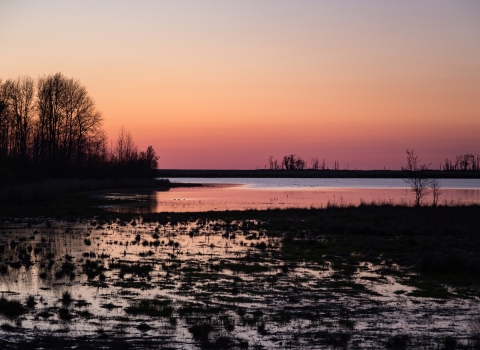On Dec. 3, 1998, the U.S. Department of Justice, on behalf of the U.S. Fish and Wildlife Service, the National Audubon Society, and three defendants, filed a consent decree to prevent flooding in one of the Florida grasshopper sparrow's last remaining habitats.
The decree was signed by Judge Michael K. Moore in a U.S. District Court for the Southern District of Florida. As a result of this agreement, the defendants and the National Audubon Society will install 11 culverts along two-and-a-half miles of the Society's Ordway-Whittell Kissimmee Prairie Sanctuary in Okeechobee County. The culverts will allow more natural water flow, thus preventing the impoundment of water on this bird's nesting habitat. They must be installed within 60 days of the signing of the decree.
"With only one known breeding pair of this sparrow left in the sanctuary, we're glad that we could finally all come to this agreement" said Sam D. Hamilton, Southeast Regional Director of the U.S. Fish and Wildlife Service. "The sanctuary's population is the only one found on private land, and one of only six remaining populations of this tiny bird."
Hamilton went on to say that the culverts are expected to be in place before next year's breeding season which typically begins in mid- or late March.
The decree ends three-and-a-half years of negotiations between three private landowners
-- Mr. Haynes Williams of 101 Ranch, and Michael and Steve Powell of Tiger Cattle Company -- and the National Audubon Society. Several State, private, and Federal agencies, including the U.S. Fish and Wildlife Service, have also been involved. In mid-May of this year, the Service and the National Audubon Society were granted an immediate injunction to prevent the defendants from "taking" the endangered bird under Section Nine of the Endangered Species Act. The suit claimed that actions by the defendants had altered the historic drainage patterns of the water on the sanctuary. The term "taking" involves harming an endangered species. Harming involves acts which could kill or injure a species, including habitat degradation that impairs species behavior patterns such as breeding, feeding, or sheltering.
On October 26, the National Audubon Society, the Service, and the defendants entered into a mediation session and cooperatively worked out a plan -- the consent decree -- to remedy flooding of sparrow habitat.
The Florida grasshopper sparrow is a brown songbird, named from the insect-like quality of its song. It is non-migratory and immobile compared to other birds, which makes it essential that its last remaining dry prairie habitat in south central Florida be protected. With a life expectancy of three or four years, only about 300 breeding pairs of the bird remain. In 1993, there were 16 breeding pairs of the bird in the Sanctuary; the decline to one breeding pair today is due to human disruption of natural water flows, together with higher-than-average rainfall in the area.
The U.S. Fish and Wildlife Service is the principal Federal agency responsible for conserving, protecting, and enhancing fish and wildlife and their habitats for the continuing benefit of the American people. The Service manages the 93-million-acre National Wildlife Refuge System comprising more than 500 national wildlife refuges, thousands of small wetlands, and other special management areas. It also operates 66 national fish hatcheries and 78 ecological services field stations. The agency enforces Federal wildlife laws, administers the Endangered Species Act, manages migratory bird populations, restores nationally significant fisheries, conserves and restores wildlife habitat such as wetlands, and helps foreign governments with their conservation efforts. It also oversees the Federal Aid program that distributes hundreds of millions of dollars in excise taxes on fishing and hunting equipment to state wildlife agencies.
X X X
Release #: R99-001


